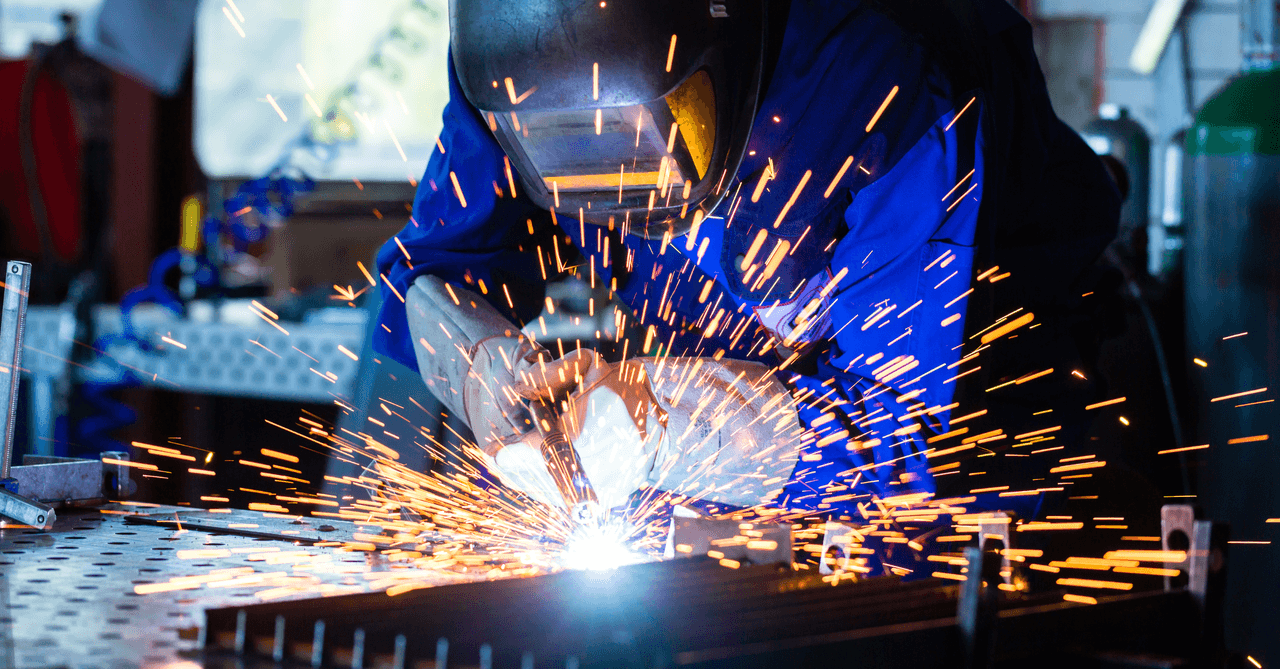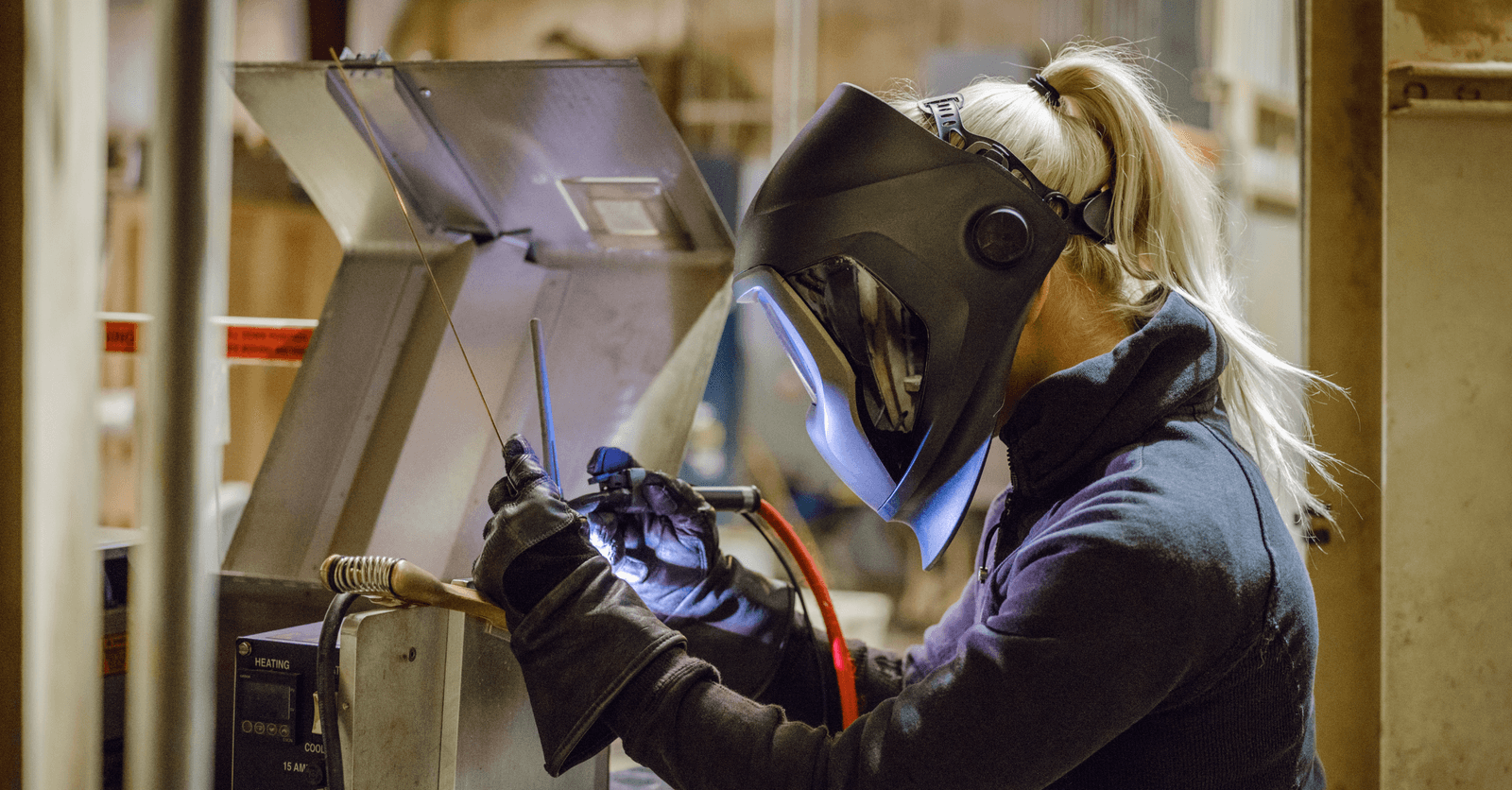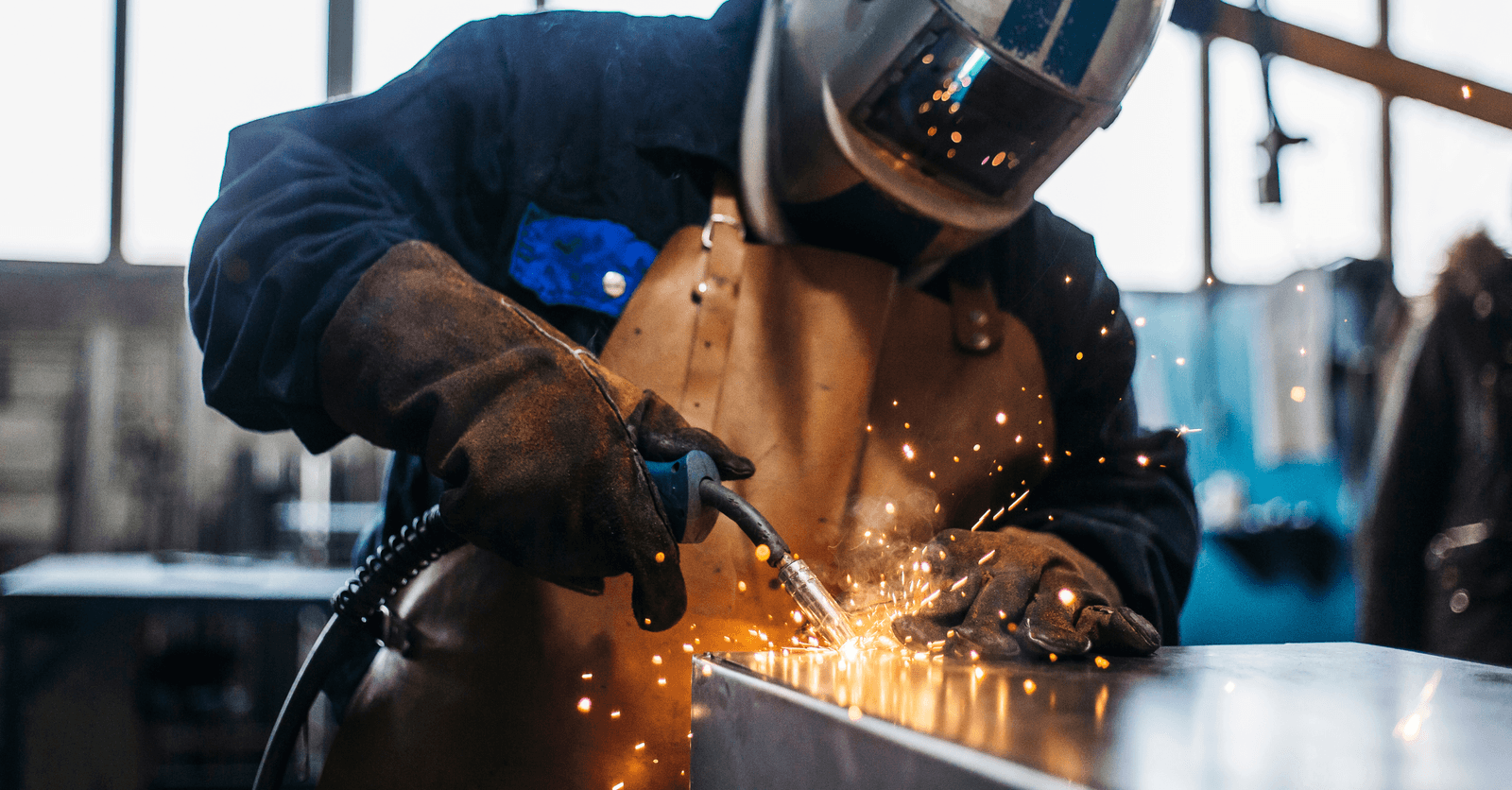
Welding is a creative trade, the likes of which few blue-collar trades still encompass. Skilled welders can work in any environment with a variety of materials and techniques. From skills to salary to job opportunities, learn everything there is to know about welding.
Welder: Ins and Outs of the Trade

Source: Canva
Welders are responsible for assembling, repairing, cutting, or reshaping products using different alloys. They’re vital members of the industrial workforce, but also work for utilities and construction companies, and power plants:
Chemical industry;
Petroleum industry;
Automobile industry;
Nuclear power industry;
Power plants;
Building and civil engineering;
etc.
Expertise in metallurgy is called upon when welding, soldering, or brazing elements to meet specific constraints. Thus, welders work in highly complex environments, whether it be on the top of a wind turbine, in a nuclear power plant's reactor building, or simply in a workshop.
Being a welder requires one to understand information related to the specifications of the task at hand. This requires the tradesperson to be able to interpret diagrams, but also understand the provided instructions.
The welder has to be able to determine which welding technique to use at any given time. They must be capable of carrying out their work using the techniques required to produce smooth surfaces (e.g. gouging, chamfering, or preheating).
Once the welding material’s in place, the welder must ensure that the work is being performed in a secure environment, for their safety and that of others.
Welding Techniques
Difference between welding, soldering, and brazing
Welding consists of assembling two pieces of same-nature metals using heat or same-metal filler.
On the other hand, soldering and brazing involve welding two pieces of metal with a different filler metal at very high temperatures. At this point (beyond 450℃), a welder is called a brazing machine operator or a brazing machine setter.
How to choose between the three? Whether the material in question is soldered, brazed, or welded really depends on the constraints imposed on the finished product. Generally speaking, the welder, with their expertise, will choose which type of filler metal to use in order to obtain optimal resistance, thereby meeting the client's specifications.
However, some regulations may restrict the welder's work, thereby requiring them to select certain types of metals over others and use hard soldering methods (also known as brazing) rather than soft soldering methods.
It’s most commonly seen in the housing industry when it comes to brazing distribution gas pipelines. We can thus gather that welders face very challenging duties.
Manual and Semi-Automatic Welding
This involves knowing how to operate lifting equipment and jig borers to set up and maintain all the tools needed to perform welding duties.
Once the welding station is properly set up, welders have to manage the chemical polarity, transfer mode, current and arc voltage, as well as the unwinding speed of the wire electrode, according to the chosen welding process, while also managing the shielding gas flow.
Once the whole of the task is up and running and under control, welders can then start welding according to the appropriate methods taught.
Related Duties
Welding isn't the only part of a welder's job. Mastering joints is a key part of the job. In doing so, they must know how to grind, brush, sand, or degrease the components at their disposal.
Such operations have to comply with the provided specifications. When gouging is required, welders must be able to use either the carbon-arc gouging or plasma-arc gouging (a variation of PAC) methods.
Lastly, to avoid joints cracking under too much hydrogen release, welders have to manage the temperature of the welding tool both during the process and during the post-weld heat treatment.
Tools
Provided they have the appropriate tools handy, welders can carry out the work mentioned above. Generally speaking, the two types of welding methods mentioned below require specific equipment.
Oxy-fuel welding:
Blowtorch or welding torch;
Gas cylinder;
Filler metal;
Locking pliers.
Arc welding:
Welding rods (or electrodes);
Welding booth (such as shunts, MIG/MAG or inverter);
Welding hammer;
Steel wire brush;
Welding magnet;
Welding helmet;
Leather welding apron;
Protective gloves.
Weld Quality Assurance & Control
Welders often work alone, but the quality of their work is always monitored to ensure that the welds produced are tight and strong. This is generally managed by an engineer.
However, some companies ensure weld quality by means of control companies. These companies will intervene prior to the welder taking up work on the actual components. The welder will be tasked to make similar welds to the ones required. These are then submitted to the control company for testing, both visually and under stress, sometimes to the point of failure. Once the welder is certified by the control company, they're cleared to work for said company.
In Canada, quality control is based on CSA W & Z standards, which include:
Fusion welding (standard CSA W47.1);
Fusion welding of aluminum (standard CSA W47.2);
Steel and aluminum resistance welding (standard CSA W55.3);
Oil and gas pipeline system welding (standard CSA Z662).
Every country has its own set of standards which, although they may be different in name, are similar in form. For example, American welders follow AWS and API standards, while European welders follow ISO standards.
While we've covered the role of a QA engineer and that of quality control companies, the main weld quality assurance officer is the welder themselves, who must know how to check their own work as they're progressing to immediately make the necessary corrections if needed.
Once welding flaws are identified, the welder in question must be able to rectify the welds according to the set of standards and those established by the client. They must then be able to reshape the components that they’re welding if those have warped in the process.
Welder: Training & Requirements

Source: Canva
To qualify as a welder, you must complete vocational training prior to completing your trade training. In general, to qualify to become a welder, one must:
Hold a high school diploma;
Have trained for three years or have three years of experience in the trade;
Have completed specialized welding training.
However, those who don't thrive in a school environment shouldn't assume that not having a degree or apprenticeship is a deal breaker. In Quebec, more than a quarter of welders learned the tricks of the trade on the job. So, they neither have a diploma, nor received any professional training, and this hasn't prevented them from becoming good welders.
The same applies to brazing machine operators and brazing machine setters, whose professional qualifications are as follows:
High school education (diploma not required);
Complete several months of training in the trade;
Complete an operator apprenticeship (not always required);
Background in robotics.
Being a welder is a career path that’s accessible to all persons motivated by this exciting trade.
Welder: Skills & Qualifications
Attention to detail is an indispensable quality among welders, so if you're meticulous, step right up. Since welders often work in environments that are just as diverse as they're varied, being physically fit and having good eyesight are very much assets. In fact, welders are frequently required to work in loud and confined spaces, and in awkward positions.
Welders must master the following four essential skills:
Plan welding work accordingly;
Master manual and semi-automatic welding methods;
Accurately check welds;
Complete welding-related tasks.
To master these professional skills, one must be able to:
Read and understand forms, instructions, data sheets, service memos, rules, welding codes and procedures;
Read and understand diagrams, signs, symbols, and hazard signs related to a work environment;
Understand installation manuals;
Know the different categories of metals and alloys;
Read circuit diagrams;
Read installation plans;
Read and understand charts featuring complex metal specs and tolerances;
Write up comprehensive work-related notes and accident reports;
Master math concepts such as angles, temperatures, sizes, pressure, volume, diameter, and arithmetic;
Attend meetings and share knowledge.
Some welders stumbled into the trade after getting into welding as a hobby, others after hearing about a job opportunity. All have developed a passion for it. Welders are essentially metal tailors.
Welders build tanks, dumpsters, and leak-proof pipelines, and basically learn on the job by working with a close-knit team. Choosing to be a welder means choosing unity. And, welders can work in aeronautics, the nuclear power industry, aerospace, and even underwater as underwater welders.
Salary & Job Opportunities
It’s rather difficult to establish the set salary of a welder due to one major element: location.
In Canada, on average, a welder makes $25.50 an hour. However, in Quebec, the median wage of welders is $23.50, and there are significant regional disparities. As a matter of fact, in the Eastern Townships, the median wage for welders is $21 per hour, while it's $26 in the Outaouais and Abitibi-Témiscamingue regions.
In Alberta, the median wage of a welder or soldering machine operator is $34, while it barely hits $21.75 in Prince Edward Island. However, the current employment opportunities in the province of Quebec indicate that there's potential to negotiate a better wage.
In 2006, the province of Quebec employed 22,385 welders. Some 15 years later, that figure dropped to 21,000, so much so that Radio-Canada issued a public appeal for help in 2019.
In the province of Quebec, employers are forced to recruit abroad, mainly in Tunisia, because the demand for workers is so high. The Canadian legislation regarding foreign workers, mainly in regard to low-wage jobs, meant some employers were forced to raise the hourly wage to get around the law. A blessing in disguise for all welders.
Though the chances of getting a job are already good, thanks to the high demand, some types of welders are more sought after than others, especially those who work with:
Gas tungsten arc welding (GTAW).
The other two main welding methods are:
Gas metal arc welding (GMAW);
Shielded metal arc welding (SMAW).
If you’re a woman, it can make a difference. And why’s that? Because right now, women account for less than 4% of the workforce.
Looking for something else?
Related articles
The latest industry news, interviews, technologies, and resources.

Editorial Team
•08 Oct 2025
Are you passionate about computers, electronics, and new technologies? Are you drawn to manual work, in which the words "build," "repair," or "install" sound like true challenges to you? Electricity, intricate components, and problem-solving don't scare you?

Editorial Team
•26 Aug 2025
In the construction industry, sharing knowledge and mentoring new talent are essential to ensure a wave of succession and to promote the industry. Given this perspective, virtual mentorships prove to be a promising solution. On account of technological breakthroughs and the onset of custom platforms, you can now benefit from remote expert advice.

Editorial Team
•25 Sep 2024
Looking to change your kitchen countertop but think you can’t afford it? A countertop is a work surface that needs to be both practical and aesthetically pleasing. It is also one of the elements that can be very expensive when renovating a kitchen.

Editorial Team
•04 Nov 2025
Dormers, which were first introduced in the early Gothic period, continue to attract homeowners searching for a certain elegance and refinement when it comes to the roof of their houses. In due part because of its timeless style, the dormer window perfectly adorns the exterior of any home.

Editorial Team
•23 Jul 2025
Are you looking for a space heater but not sure which one is right for you? Between gas-fueled, electric, or wood-burning models, options aren’t what's lacking, and each has device-specific advantages and drawbacks.